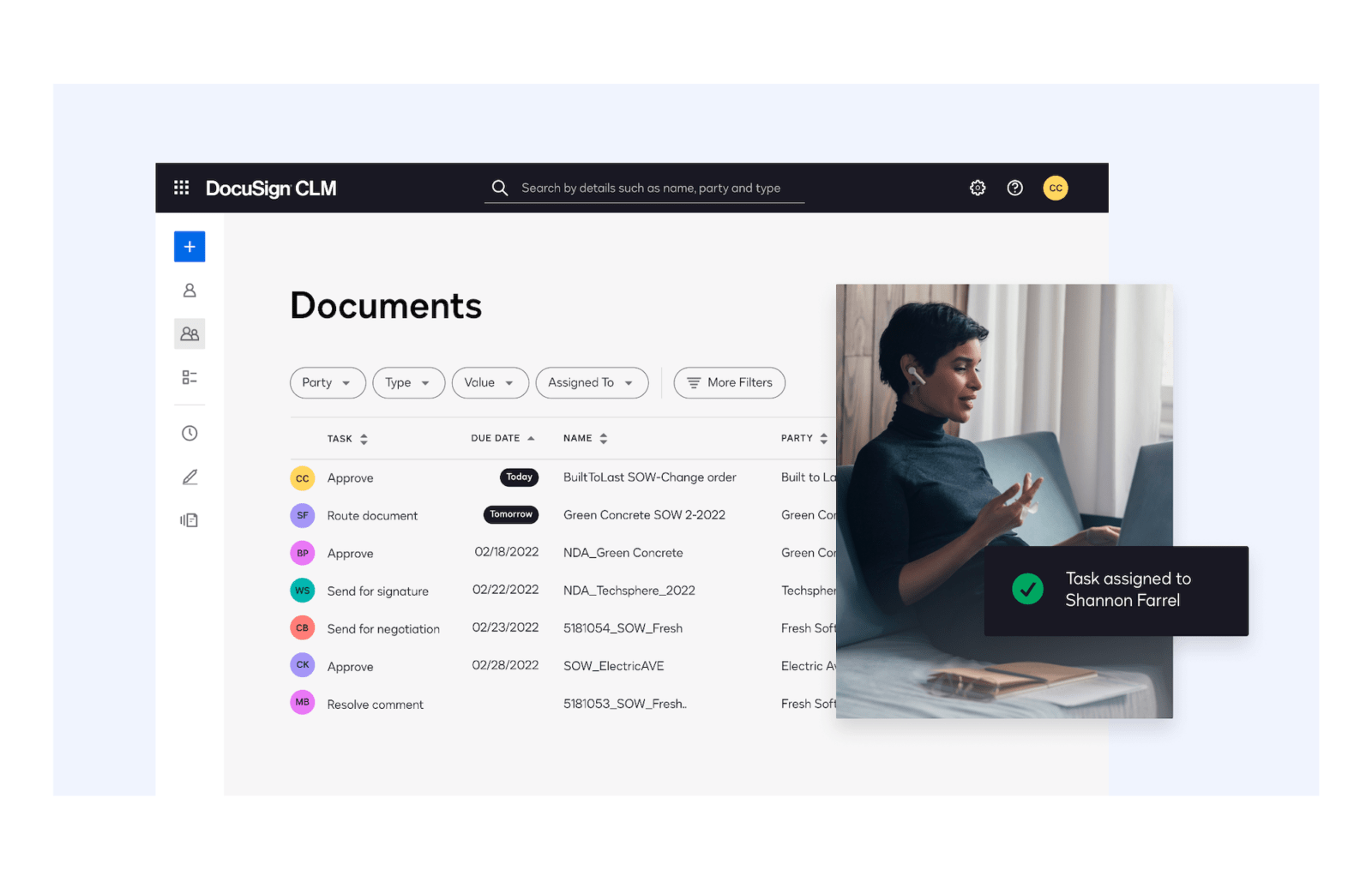
DocuSign CLM (including Seal Software): Complete Buyer's Guide
Enterprise-grade contract lifecycle management solution
DocuSign CLM positions itself as a comprehensive Agreement Cloud platform that addresses critical pain points in legal contract management through AI-powered automation and workflow optimization. The platform's strategic foundation rests on combining DocuSign's established e-signature market leadership with Seal Software's AI-driven contract analytics capabilities, creating an integrated solution for automated clause extraction, risk analysis, and workflow automation[41][42][45].
Market Position & Maturity
Market Standing
DocuSign CLM occupies a strong enterprise market position built on DocuSign's established brand recognition in e-signature solutions and strategic AI capabilities acquired through the $188 million Seal Software acquisition[41][42][45].
Company Maturity
The vendor demonstrates substantial market maturity with documented enterprise customer implementations including Fortune 500 legal departments that leverage the platform's Salesforce integration advantages[58].
Industry Recognition
Industry recognition includes Forrester's documented ROI validation of 449% potential returns, though customer reviews reveal mixed implementation experiences with challenging UX and complex deployment requirements[48][50][53].
Strategic Partnerships
Company stability indicators include established enterprise relationships and integration partnerships with Salesforce and SAP Ariba, positioning DocuSign as a trusted vendor for large-scale implementations[58].
Longevity Assessment
The platform's long-term viability appears strong based on DocuSign's market position and enterprise customer base, though competitive pressure from AI-native solutions requires continued innovation investment[55][57].
Proof of Capabilities
Customer Evidence
Enterprise customer implementations demonstrate measurable outcomes across multiple industries and use cases. iCIMS reported that a significant majority of agreements no longer require legal intervention post-implementation, with substantial growth in custom agreement processing capabilities[51]. Vestwell achieved revenue acceleration through automated contracting, while Celonis accelerated digital transformation with centralized workflows that streamlined cross-departmental collaboration[58].
Quantified Outcomes
Quantified performance evidence shows substantial efficiency gains in properly executed implementations. Sprinklr reduced contract lifecycle duration by 84% post-integration, demonstrating the platform's potential for comprehensive workflow optimization[33]. AI-driven capabilities deliver 40% faster contract processing compared to manual methods, though implementation success varies significantly based on organizational readiness and resource allocation[2][16].
Market Validation
Market validation includes documented enterprise adoption among Fortune 500 legal departments that prioritize vendor stability and comprehensive integration capabilities[58].
Competitive Wins
Competitive wins demonstrate market traction against alternatives, though customer reviews reveal implementation challenges including complex UX and difficulty tracking opportunity-quote alignment[53].
Reference Customers
Reference customer evidence includes multiple enterprise implementations across industries, though approximately 30% of CLM projects stall at proof-of-concept due to template standardization failures that force legal teams to revert to manual processes for high-stakes contracts[44][53].
AI Technology
DocuSign CLM's technical foundation centers on Iris, its proprietary AI engine that enables agreement summarization and AI-assisted review capabilities, though current functionality supports only English-language contracts[43][46].
Architecture
The workflow automation architecture features a drag-and-drop editor with pre-configured steps, though conditional logic implementation requires extensive customization and technical expertise[53][58].
Primary Competitors
Primary competitors include AI-native platforms like Evisort and Luminance that specialize in legal-specific AI training, offering domain expertise with 2 trillion legal token training for advanced functionality like handwritten text analysis[18][55][57].
Competitive Advantages
Competitive advantages center on Salesforce integration depth that provides significant benefits for enterprise organizations already invested in Salesforce ecosystems, combined with brand trust and market recognition in e-signature solutions that create adoption advantages[58].
Market Positioning
Market positioning emphasizes enterprise vendor stability and comprehensive integration capabilities, though AI-native platforms offer advanced legal-specific training that may provide superior accuracy for complex legal reasoning tasks[55][57].
Win/Loss Scenarios
Win scenarios favor organizations with established Salesforce environments and substantial contract volumes requiring comprehensive transformation[58]. Loss scenarios include organizations prioritizing rapid deployment, advanced AI capabilities, or cost-effectiveness for smaller contract volumes where alternatives provide better value propositions[35][55].
Key Features

Pros & Cons
Use Cases
Integrations
Featured In Articles
Comprehensive analysis of AI Lifecycle Management for Legal/Law Firm AI Tools for Legal/Law Firm AI Tools professionals. Expert evaluation of features, pricing, and implementation.
How We Researched This Guide
About This Guide: This comprehensive analysis is based on extensive competitive intelligence and real-world implementation data from leading AI vendors. StayModern updates this guide quarterly to reflect market developments and vendor performance changes.
59+ verified sources per analysis including official documentation, customer reviews, analyst reports, and industry publications.
- • Vendor documentation & whitepapers
- • Customer testimonials & case studies
- • Third-party analyst assessments
- • Industry benchmarking reports
Standardized assessment framework across 8 key dimensions for objective comparison.
- • Technology capabilities & architecture
- • Market position & customer evidence
- • Implementation experience & support
- • Pricing value & competitive position
Research is refreshed every 90 days to capture market changes and new vendor capabilities.
- • New product releases & features
- • Market positioning changes
- • Customer feedback integration
- • Competitive landscape shifts
Every claim is source-linked with direct citations to original materials for verification.
- • Clickable citation links
- • Original source attribution
- • Date stamps for currency
- • Quality score validation
Analysis follows systematic research protocols with consistent evaluation frameworks.
- • Standardized assessment criteria
- • Multi-source verification process
- • Consistent evaluation methodology
- • Quality assurance protocols
Buyer-focused analysis with transparent methodology and factual accuracy commitment.
- • Objective comparative analysis
- • Transparent research methodology
- • Factual accuracy commitment
- • Continuous quality improvement
Quality Commitment: If you find any inaccuracies in our analysis on this page, please contact us at research@staymodern.ai. We're committed to maintaining the highest standards of research integrity and will investigate and correct any issues promptly.